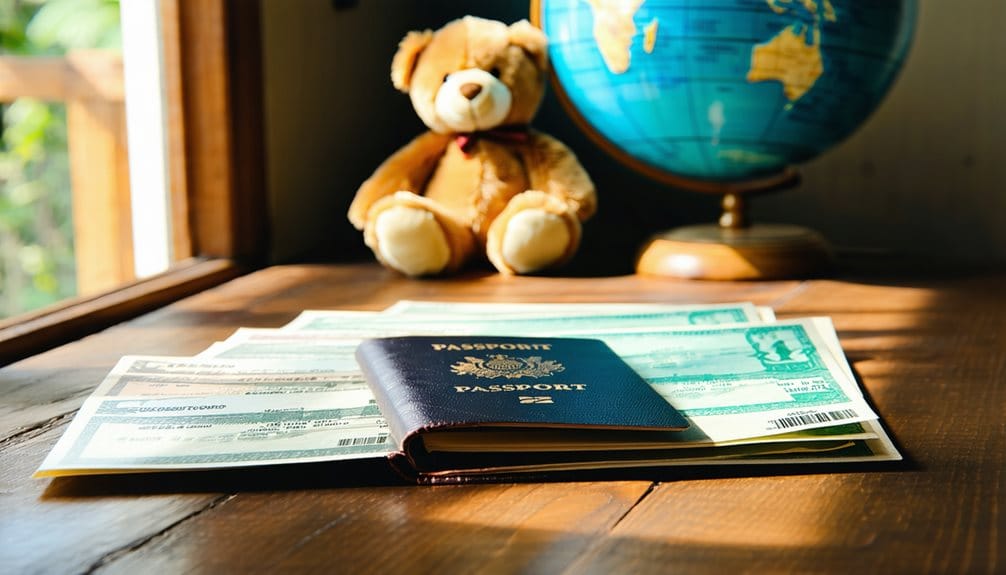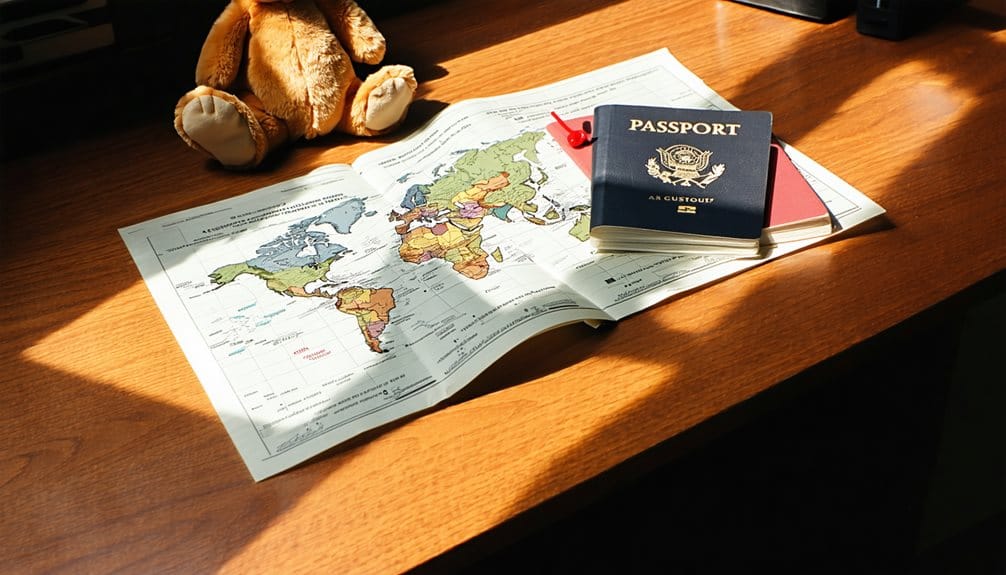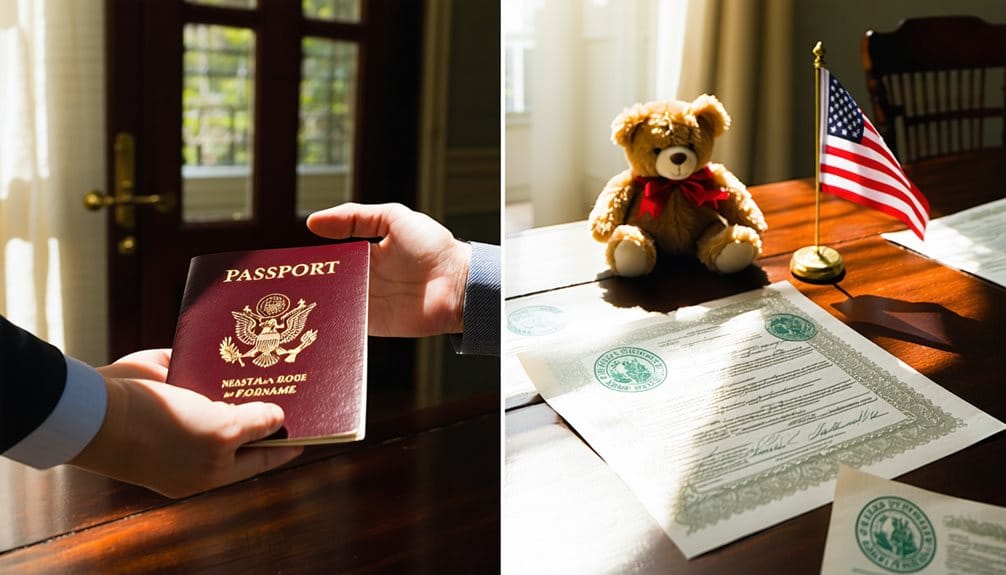If you receive an inheritance during a marriage or de facto relationship, it may be treated as part of [...]
International child custody agreements are complex legal arrangements that determine how parental responsibilities are shared when parents live in different countries. These agreements often involve navigating cross-border laws, treaties like the Hague Convention, and jurisdictional questions that impact where and how custody is enforced. Understanding your child’s habitual residence is essential, as it helps define which country’s court has authority. With so much at stake, working with family lawyers experienced in international custody cases is crucial to ensure your child’s best interests are fully protected.
Understanding International Child Custody Agreements


You’ll need to grasp the complex web of international child custody agreements that span multiple jurisdictions and legal systems when dealing with cross-border custody arrangements. These agreements are the foundation for legally managing parenting rights and responsibilities when families are separated by national borders. International child custody agreements rely heavily on conventions like the Hague Convention to ensure consistent application of law and protection of children’s rights.
Overview of International Child Custody Agreements and Laws
International child custody agreements are shaped by a maze of legal frameworks that vary considerably from country to country. The Hague Convention is a cornerstone in these agreements, governing international abduction cases and helping enforce custody orders across borders. Your child’s habitual residence plays a key role in determining which legal system applies. When reviewing international child custody agreements, remember that courts will always prioritise the child’s best interests, regardless of which country is involved.
Role of International Family Law in Custody Cases
Building on these foundational laws, the role of international family law provides a framework for resolving complex custody disputes. International child custody agreements draw legal legitimacy from this framework, helping parents work through legal challenges and safeguard children’s wellbeing. When facing an international family law issue, the Hague Convention supports the enforcement of these agreements and helps resolve disputes involving abduction, relocation, or visitation rights. The concept of habitual residence is critical, as it determines which nation has legal jurisdiction under most international child custody agreements.
Key Challenges in Cross-Border Custody Arrangements
When manoeuvring through cross-border custody arrangements, parents encounter challenges that international child custody agreements aim to solve. These include the risk of international abduction, difficulty in enforcing custody orders abroad, and legal inconsistencies between jurisdictions. While the Hague Convention provides a framework, not all countries are signatories, complicating international child custody agreements where legal cooperation is limited. Parents must also manage logistical hurdles, such as coordinating visitation schedules across time zones and dealing with language barriers.
Why International Child Custody Agreements Matter
These agreements serve as legal safeguards that protect both the rights of the child and the interests of the parents. In cases where parents reside in different countries, international child custody agreements offer a structured process to resolve disputes, ensure continuity in the child’s upbringing, and establish legal expectations. Without such agreements, custody disputes can lead to prolonged court battles, jurisdictional conflict, and emotional stress for the child involved.
The Hague Convention and International Child Custody


You’ll find the Hague Convention serves as your primary safeguard in international custody disputes, offering a clear framework for returning children wrongfully taken across borders. When you’re dealing with custody matters involving countries that have signed the Convention, you can work through your nation’s Central Authority to initiate legal proceedings for your child’s return. You must understand that while the Convention provides standardised procedures across its 90+ member countries, the success of your case depends on proving wrongful removal and addressing any valid defences the other parent might raise.
Purpose and Scope of the Hague Convention
Since international child custody disputes became increasingly complex in the modern era, the Hague Convention emerged as an essential framework to protect children from parental abduction across borders.
The Convention’s scope encompasses:
- Swift return of children to their habitual residence
- Legal cooperation between signatory countries
- Establishment of central authorities to facilitate the return process
You’ll find that over 90 nations have committed to this legal framework, ensuring consistent child custody protection worldwide.
Legal Framework & Application in Different Countries
The global implementation of the Hague Convention reveals significant variations in how different countries interpret and enforce its provisions. You’ll find jurisdiction primarily determined by your child’s habitual residence, which affects international child support and legal actions. Different legal systems handle international agreements distinctly, while non-signatory countries pose unique challenges. For success, you’ll need effective legal representation familiar with cross-border custody complexities.
Hague Convention Legal Procedures & Enforcement
When dealing with international custody disputes, understanding the Hague Convention’s legal procedures is crucial for protecting your child’s interests across borders.
If you’re facing international abduction or wrongful removal issues, remember these critical steps:
- File your return process application within one year
- Prove your child’s habitual residence
- Document evidence for enforcement through your country’s Central Authority
The Convention’s enforcement mechanisms guarantee swift resolution in custody disputes among 90+ signatory nations.
Resolving International Custody Disputes
If you’re facing an international custody dispute, your first step should be securing experienced family lawyers who understand cross-border legal frameworks and can guide you through the complexities of multiple jurisdictions. You’ll need to explore mediation as a primary resolution method, which can help maintain cooperative relationships and protect your child’s best interests while manoeuvring through different legal systems. Your legal counsel will help you develop a strategic approach that considers international treaties, cultural differences, and enforcement mechanisms to reach a workable custody agreement.
Steps to Settle Cross-Border Custody Disputes
Resolving international custody disputes requires a systematic approach to manoeuvre complex legal frameworks and protect children’s interests. When manoeuvring cross-border custody arrangements, understand the Hague Convention’s role in preventing international abduction by a parent.
- Determine the child’s habitual residence and applicable jurisdiction
- Pursue mediation before litigation to protect legal rights
- Document all agreements and maintain clear communication channels
Role of International Family Lawyers in Custody Battles
International family lawyers serve as essential guides through the maze of cross-border custody battles. They’ll help you navigate complex custody agreements under international family law while ensuring compliance with the Hague Convention. Your lawyer will determine your child’s habitual residence, protect against child abduction risks, establish legal rights for international travel, and negotiate solutions that safeguard relationships between parents and children.
Importance of Legal Counsel & Mediation in Custody Conflicts
Legal counsel and mediation play pivotal roles when parents face cross-border custody disputes. In protecting your child’s best interests and legal rights, experienced attorneys navigate complex international laws, including the Hague Convention.
When pursuing Family Dispute Resolution, you’ll benefit from:
- Expert guidance through international abduction prevention
- Structured mediation to resolve custody conflicts amicably
- Protection of parental rights across jurisdictional boundaries
Jurisdiction Issues in International Child Custody Cases


When your child custody case spans multiple countries, you’ll need to understand how courts determine which nation has the authority to make binding decisions about your children, typically based on their habitual residence. You might face situations where different countries issue conflicting custody orders, creating legal gridlock until jurisdictional matters are resolved through international treaties or diplomatic channels. Even after you’ve secured a custody ruling in one country, you’ll often encounter challenges enforcing these orders across borders, requiring careful navigation of international legal frameworks and local enforcement mechanisms.
How Jurisdiction is Determined in Custody Cases
Determining jurisdiction in cross-border custody cases hinges on three key factors: the child’s habitual residence, parental consent, and substantial connections to a particular country.
When traversing international borders, you’ll need to understand:
- Your child’s habitual residence determines primary jurisdiction under the Hague Convention
- Parental agreements can influence which courts handle custody arrangements
- Substantial connections, including nationality and home location, impact jurisdictional decisions and custody orders
Impact of Conflicting Court Orders from Different Countries
Parents pursuing custody orders in multiple countries can find themselves caught in a complex web of conflicting rulings, creating significant challenges for enforcement and compliance. When jurisdictional challenges arise, the principle of habitual residence becomes vital in determining which court’s authority prevails. While the Hague Convention provides a framework for resolving custody disputes, legal navigation through international treaties remains essential, especially when dealing with non-signatory countries.
Challenges in Enforcing Custody Rulings Across Borders
Beyond conflicting court orders lies an even more complex challenge: enforcing custody rulings across international borders. When you’re manoeuvring jurisdictional issues, you’ll encounter:
- Limited enforcement power in non-Hague Convention countries
- Complex parental agreements requiring specialised legal representation
- Varying interpretations of cooperative enforcement mechanisms
Success depends on understanding these challenges and securing international family law expertise before custody disputes escalate.
Impact of International Treaties on Child Custody


International treaties directly shape how you’ll handle child custody cases across borders, with the Hague Convention serving as your primary framework for resolving disputes and protecting children’s interests. You’ll find these global agreements establish clear protocols for determining jurisdiction, preventing child abduction, and ensuring consistent enforcement of custody orders among member nations. When you’re working with international custody cases, you must understand how these treaties influence your rights and obligations while providing mechanisms for cooperation between different legal systems.
How Global Agreements Shape Custody Laws
When custody disputes cross national borders, global agreements like the Hague Convention play an essential role in establishing consistent legal frameworks. You’ll find that understanding these international treaties helps navigate complex custody arrangements effectively.
Key mechanisms include:
- Facilitating swift return of abducted children
- Enforcing custody orders across signatory nations
- Establishing jurisdiction in the child’s habitual residence
In non-signatory countries, you’ll need specialised professional legal advice to navigate the varying legal landscape.
Best Practices for Handling Custody Cases Under International Law
Building on the foundation of global agreements, successful handling of international custody cases demands specific best practices and protocols. You’ll need to understand the Hague Convention’s scope among signatory countries and establish habitual residence early. When managing child custody disputes, you must navigate international law carefully, considering both parental responsibility and international relocation requirements under relevant custody agreements.
Key Complexities in International Child Custody Disputes


When you’re facing an international custody dispute, you’ll need to handle both the legal maze of overlapping jurisdictions and the emotional strain of potential child relocation or abduction. You’ll find that managing these cases requires careful attention to international treaties, local laws, and cultural differences while maintaining focus on protecting your child’s well-being. Your success in manoeuvring cross-border custody often depends on understanding how different legal systems interact and working proactively with legal experts who specialise in international family law.
Navigating Legal & Emotional Complexities in Cross-Border Custody
International custody disputes present a maze of legal and emotional challenges that you’ll need to navigate carefully. When facing cross-border custody issues, consider these critical steps:
- Secure experienced legal representation familiar with the Hague Convention
- Document all interactions and establish your child’s habitual residence
- Take urgent legal action to protect your legal rights
Managing Custody Cases Involving Child Relocation or Abduction
Cross-border child relocation and abduction represent some of the most challenging scenarios in international custody disputes. When one parent considers abducting the child or relocating internationally, you’ll need to understand your legal rights under the Hague Convention. This treaty provides mechanisms for resolving custody agreements through court proceedings, ensuring the protection of both parents and the child during complex child relocation cases.
Prioritizing the Best Interests of the Child in International Cases
Determining a child’s best interests lies at the heart of complex international custody disputes. When traversing the Hague Convention and parental rights across borders, you’ll need to take into account:
- Cultural differences affecting custody arrangements and interpretation of legal frameworks
- The child’s emotional wellbeing and relationships with both parents
- Legal complexities surrounding international child custody, especially in relocation cases
These factors shape your approach to securing ideal outcomes.
Final Thoughts
Managing custody arrangements across different countries can be quite the ride, huh? But guess what? You’re not doing this solo. By getting a grip on international laws, keeping those lines of communication open, and teaming up with seasoned legal pros, you’re on your way to crafting a custody plan that really works.
In summary, international child custody agreements are essential tools for navigating the complex legal landscape of cross-border parenting. Whether you’re entering negotiations, seeking enforcement of an order, or responding to an abduction case, these agreements backed by international treaties can help ensure your child’s best interests are protected. Always seek legal advice to properly draft, understand, and enforce any international child custody agreement.
























